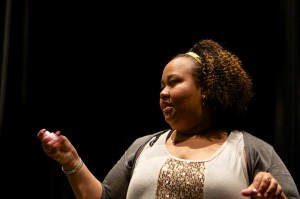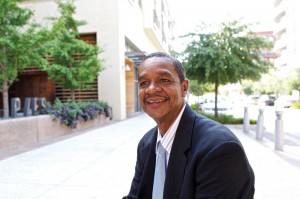With a handful of friends doing administrative and production duties, Keyton’s theater company DVA Productions staged its first show in 2008 at the Fort Worth Community Arts Center. The letters DVA almost spell the word “diva,” but they’re lacking one thing: the “I.” Keyton chose this name as both an in-joke about her career and a statement of purpose: DVA would operate with all the boldness and high standards of her diva reputation but not as an exclusive venue to showcase flamboyant roles for her.

From the beginning, Keyton wanted to accomplish a few things with DVA. First, she wanted to do more youth outreach, especially to the African-American community in North Texas. She hoped to train young black theater artists the way Eastman had trained her and so many Jubilee stars, but on a bigger and more formal scale.
Second, she wanted to provide more opportunities for African-American actors and playwrights period. Racial and ethnic diversity are ongoing issues within the live theater world as much as anywhere else and possibly more so: Though the situation is better than when Keyton started performing in 1992, there still aren’t a lot of stage roles written specifically for black actors (or Latino actors, or Asian actors, etc.). Race-blind casting is an option but doesn’t always work given the particular demands of the material.
“Most theaters try to do at least one show a season that has great African-American roles in it,” she said. “That’s wonderful, but it still leaves us [African-American actors] vying for a small number of parts in the same shows. I wanted to create more opportunites with DVA shows.”
Finally, Keyton wanted to expose underserved communities, including African-Americans, to live theater, while still pursuing a goal of ethnic and racial diversity within DVA’s audience. That’s where her friend Jennifer Porter-Kennard, the company’s marketing manager and production assistant, comes in. A former patron development staffer at Texas Ballet Theater, Porter-Kennard runs DVA’s Facebook and Twitter accounts as well as its website, and she helps schedule DVA appearances at public events to raise the group’s profile. They’ve done everything from run booths at the twice-annual Arts Goggle event to conducting free exercise, dance, and zumba classes on Saturdays at Fort Worth’s Candleridge Park.
“My job is to get people excited about DVA,” she said. “That can mean talking about the show [that’s being staged at the moment] or the importance of funding the arts in general or just about Sheran. People know her from different places –– Jubilee, Scat Jazz Lounge, or Tucker’s Blues Bar [a Dallas blues nightclub where she sometimes performs]. She’s got a following, especially among women. We try to translate that into ticket sales.”

“We want to be more than just ‘the little black theater company,’ ” continued Porter-Kennard. “But at the same time, we want people from certain communities, be it black or Hispanic, to know that live theater isn’t just for rich people.”
Yet even with Keyton’s stellar resumé, getting a new theater company off the ground can sometimes feel like pushing a giant boulder uphill. DVA produced only one show a year for its first three seasons, largely because renting any theater space is costly. While she was trying to establish DVA, Keyton gradually decreased her post-Eastman involvement with Jubilee but continued to appear in shows there during artistic director Ed Smith’s four-year tenure. She has not worked with current Jubilee head Tre Garrett, who came aboard in 2010, but she hopes to sometime in the future.
Thanks in part to the success of early DVA musical revues like Fat Freddy’s and I’m Every Woman (shows in which she had prominent onstage roles), Keyton and her small crew were able to schedule the company’s first full season in 2011. They also scored what looked like a permanent home when board members from Pantagleize Theatre offered DVA stage time in Pantagleize’s own renovated home next to the old Fort Worth Public Market at Henderson Street and I-30.
That season, with a combination of individual donations and private and public arts grants, Keyton was able to realize most of her early goals. The DVA Youth Program featured performances, workshops, and master classes conducted by Sheran and a few of her theatrical friends for Tarrant County young people, especially from the African-American community. The mainstage DVA productions, most of them directed by Keyton, featured shows like Billie’s Blues, a piece about Billie Holiday written by North Texas playwright Dianne Tucker and, for once, starring someone other than Keyton as a legendary diva (in this case, Tamara Stovall Peterson). The comedy A Big Girl’s Guide to Love and the revue I’m Every Woman 2: Divas & Duets were also part of the lineup. The performances ranged from sold-out houses (mostly the musicals) to only a few tickets sold (mostly the non-musical shows).
Given her storied past with Jubilee, it’s easy to wonder how many ticketbuyers followed her from there to the new company. Although Keyton has seen a few people she recognized as audience members from her Jubilee performance days, she doesn’t know if a significant percentage of DVA’s audiences first saw her at a Jubilee show. (As DVA production and house manager, King has had more direct interaction with their audiences. He estimates that 25 percent of any sold-out show comes from past or present Jubilee regulars.)
So far the biggest artistic risk taken by DVA was a staging of the docudrama The Laramie Project, Moises Kaufman’s epic examination of the 1998 murder of gay student Matthew Shepard in rural Wyoming. The play doesn’t address specifically African-American concerns, instead focusing on Midwestern attitudes toward gay people. Keyton selected the piece because she felt it was a powerful statement on the tragic consequences of prejudice. But she was surprised by some reactions in Fort Worth’s African-American community in general and her churchgoing Christian peers in particular. Some people expressed an instant dislike of the show without having seen it.
“I still deal with a lot of old-school family members and ultra-conservative Christians,” she said. “I remember going to a couple of boutiques and asking if I could put up the Laramie Project posters. They said, ‘I’m not going to support that gay show.’ I tried to explain that it wasn’t really ‘a gay show’ but a play about intolerance and hate. My eyes had not been open before to that kind of foolishness, I admit.” Keyton also got some pushback about the profanity and drug abuse in Simply Etta, Dianne Tucker’s adaptation of singer Etta James’ no-holds-barred autobiography that DVA produced earlier this year with Keyton as James.
But DVA faced more fundamental problems after its first season. Scheduling conflicts meant the company lost its performance home at the Pantagleize space, so they wound up back at the Fort Worth Community Arts Center for the troupe’s 2012-13 shows, its second full season. The productions grew larger and more ambitious, including an all-black version of Steel Magnolias and the upcoming revival of Sam Shade: A Detective Musical. Unfortunately, the funding and marketing of DVA shows –– still the biggest obstacles to the company’s survival –– didn’t grow along with the scale of the productions.
“Our needs have evolved,” she said. “We started off doing really simple black-box theater with tiny casts and then went on to set up a beauty salon onstage with sinks and hair dryers for Steel Magnolias. The quality of our productions has grown tremendously.”
Competition for dwindling private and public arts funds is an ongoing issue for even well-established theaters, of course. But Keyton said DVA has encountered a problem that all new troupes come up against –– surviving to the five-year mark. The overseers of corporate arts foundations and government budgets often won’t consider applications for support until a group has been operating as a full-time organization for five years. DVA has three more full seasons to go before it reaches that milestone.
Right now Keyton admits that she’s not sure if DVA can afford another full season at the Fort Worth Community Arts Center. She’s hoping a continued push to make more people aware of the company and its shows will help them survive a little longer.
King has made one suggestion to bring in more money: Keyton could return to her church roots and do one or more gospel music shows each DVA season.
“DVA needs to grow its audience in new directions, so The Laramie Project was a good choice,” he said. “But theater is a social place, especially for the African-American community, and people want to see faith-based shows full of great singing. That’s a market she needs to consider.”
********
Right now Keyton the director is in final rehearsals with her actors for Sam Shade, which opens this weekend at the Community Arts Center. It’s the final show of DVA’s 2012-13 season. Keyton has begun planning a new season for the company that, at the moment, she’ll have to fund on an ad hoc basis. (Right now, she’s in discussions with a couple of local theaters about the possibility of using their spaces to stage shows during off-months, but nothing has been finalized yet.) Paying the production costs and the actors in her shows are the top priorities; after that, family, friends, and artistic associates continue to donate their time and energy to help make up the difference.
Of course, Keyton, a single mom, has to make a living for herself and her two kids. Right now they live on her private singing jobs, regular club gigs at places like Scat Jazz and Tucker’s Blues, acting roles with other companies (she just completed a run of Big River at Lyric Theatre in Oklahoma City), the occasional TV commercial, and administrative temp jobs at arts organizations like the Fort Worth Opera. In other words, she’s sacrificed security and stability for the unpredictable life of a theater artist.
Keyton’s 19-year-old son wants to follow in his mom’s footsteps and be a stage performer. He’s already begun taking classes and going out for auditions. Even knowing the pitfalls and general craziness of a life in the theater, Keyton has no interest in trying to steer him into a career that’s more stable or lucrative.
“The other day my son said to me, ‘Mom, this is exhausting,’ ” she said with a deep laugh. “I told him — and this is what I always tell myself, by the way — that as an artist, there are going to be times when you’re outright exhausted. But it’s a different kind of exhaustion because you love what you’re doing.”











